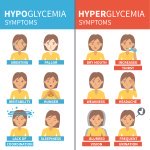Diabetes Infantil
(aka Juvenile Diabetes Mellitus)

Diabetes Infantil, also known as Juvenile Diabetes or Type 1 Diabetes, is a chronic condition where the pancreas produces little or no insulin. When type 1 diabetes comes on in childhood or adolescence, it is usually triggered by an autoimmune disease, but genetics and environmental factors may play a role as well. There is evidence that it may be caused by vaccination. Later in life, type 1 diabetes can be caused by a pancreas that simply “poops out”, meaning that it no longer makes enough insulin.
Insulin is the hormone that helps the body transport the glucose contained in food into the cells of the body where it is used as fuel. In a situation where no insulin is produced, glucose (or sugar) stays in the blood stream, where it can cause severe damage to all the organ systems within the body.
Managing Diabetes Infantil
Youngsters with type 1 diabetes must take insulin to usher the sugar in the blood into the cells. This usually means administrating insulin injections daily or having insulin delivered to the body system through an insulin pump. Testing blood sugar by pricking the fingers for blood four or more times a day is also part of the regular routine a Diabetes Infantil patient goes through.
Juvenile diabetes patients must also carefully balance their diet and their exercise routine in order to regulate or manage their blood sugar levels, in an attempt to avoid hyperglycemic (high blood sugar) and hypoglycemia (low blood sugar) reactions, which can be dangerous and life threatening.
Natural Methods for Dealing with Diabetes Infantil
Dr. Richard Bernstein, a medical doctor with type 1 diabetes has tested and recommends a ketogenic diet for diabetics of all ages. This is the diet that he as used to manage his own condition and the principals work well in children as well. You can read more about this in his book The Diabetes Solution (Hum, insert the link already in the system)
There are several studies that recommend the use of low carbohydrate diets in the treatment and/or management of type 1 diabetes:
https://www.ncbi.nlm.nih.gov/pubmed/16454166
https://www.ncbi.nlm.nih.gov/pubmed/22650646
https://www.ncbi.nlm.nih.gov/pubmed/21378215
An anti-diabetic tea supplied by the European natural medicinal herbs manufacturer Plafar has also been very successful in keeping juvenile diabetes under control. The formula lowers the glucose in the blood, reduces inflammation in the pancreas, and regulates normal body system functions.
Warning signs for Diabetes Infantil
The warning signs for Juvenile Diabetes (or type 1 diabetes) include increased appetite; sudden weight loss; extreme thirst; frequent urination; lethargy; when tested, sugar in the urine; vision changes fruity, sweet, or wine-like breath odor; heavy breathing; and even unconsciousness.
Living Healthy with Diabetes Infantil
As is the case with almost any disease, living a healthy lifestyle is important to successfully manage disease. An overall healthy diet not only increases your chance of effectively managing your Type I diabetes, but allows your digestive system to perform correctly, and your brain to function properly. Generally, effectively controlling your blood sugar levels with a healthy diet and consistent exercise will give you the opportunity to live a normal lifestyle.



New! Facebook Comments
What do you think? Share your thoughts below...